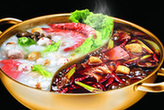Dose of reality
Real kung fu of course does not look as dazzling and dizzy as in the films. Along with enhancements from computer technology, they usually mix in some other movements that don't originate from the style. For example, the flip, which is a move often performed by Peking Opera singers, is commonly seen in kung fu movies.
"In early days there were some kung fu practitioners who wanted to try authentic kung fu in films, but the visual effect turned out really bad," said Zhang Li, author of the book Secrets of Kung Fu Films, which was published last year.
With borrowed movements like the opera's flip or others from gymnastics or even dance added in to enhance the visual effect of traditional kung fu, it seems many of the new fans like it for the wrong reasons.
"Wushu is dissimilated from its origin. With different and new film technologies emerging, Chinese wushu became well-known, but meanwhile misled people's recognition about it," Zhang told the China Newsweek in an interview.
In films, kung fu practitioners are always the first ones to jump toward the center of a room to challenge the skills of a local competitor. But in reality, Chinese kung fu practitioners are seldom seen in any of those competitive fighting events.
"Kung fu actually is not suitable for being part of modern competitive sports since its essence can't be best displayed within a short match," said Zeng, "its long history as well as the dozens of years required to practice real kung fu underlines that it is not merely about wining or losing."
"Instead, it's more like a long-term self-cultivation both physically and spiritually, in the process of which Chinese ancient philosophy, Buddhism, Taoism, and even the theory of TCM (Traditional Chinese Medicine) integrate into the practitioner's cultivation," Zeng explained.
Few true masters
Screen kung fu masters are not strange to audiences, like Wong Feihung, Huo Yuanjia, Chen Zhen and the most famous of all, Ye Wen (1893-1972, grandmaster of wing chun style and Bruce Lee's mentor). But in real life, how many of us have personally seen a kung fu master? Instead, we see imitators and even swindlers who claim the title "kung fu master."
Last September the scandal of Yan Fang, a middle-aged woman who claimed to be a master of tai chi aroused many people's curiosity. People saw her use tai chi to knock a man to the ground without touching him. But it didn't take long to expose this self-proclaimed "master" as a fraud.
"Real kung fu masters today will not appear in front of people in a high profile situation unless there is some really urgent situation endangering the country or people," said Zeng, "They are focused on their practice. If Ye Wen were living today, he would also be out of people's sight."
According to Zeng, there are around 100 kung fu masters across the country today. Unlike in the films that depict masters of different kung fu schools coming together to a certain place to fight or learn from each other, today's masters care more about where to find successors who will carry the style forward to future generations.
"But those apprentices do exchange their kung fu skills sometimes," said Zeng. Perhaps depicting that story is the best way to get real kung fu onto the big screen.
Source: Global Times





Why not rent a boyfriend, or girlfriend to please parents during the Spring Festival?